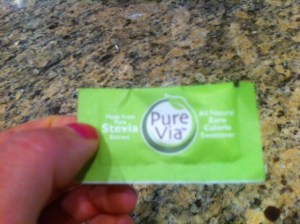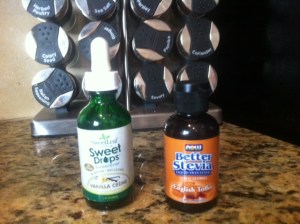I’ve spoken several times about reducing the added sugars in your diet and the harms of consuming too much sugar. But does that mean you should replace all the added sugar you’re currently consuming with artificial sweeteners?
I haven’t yet dedicated a post to artificial sweeteners because they are such a controversial topic, and there’s so much conflicting research with no black and white answer. However, several of you have asked my opinion, and it’s such a prevalent topic (after all, the average American consumes up to 24 pounds of artificial sweeteners per year!), so here we go…  (source)
(source)
- The jury is still out about artificial sweeteners causing cancer. When artificial sweeteners first took over the marketplace, there was concern that they may be linked to cancer. There are studies showing a positive correlation, studies showing no correlation, and some even showing a negative association (meaning that you’re less likely to get cancer if you eat more artificial sweeteners). The National Cancer Institute and other reputable agencies have declared the cancer connection to be untrue, and there are probably things that increase your cancer risk far more than artificial sweeteners. Still, it’s worth weighing the risk.
- However, there may be other health risks. Aside from the potential weight gain and insulin resistance that I’ll discuss in #3, artificial sweeteners may be addictive, and can also cause digestive issues, bloating, cramps, and gas. When I consumed a lot of Splenda, I didn’t think it had any negative reaction on my body, but when I cut out almost all artificial sweeteners, I noticed a huge difference in how my stomach felt.
- Aside from the health risks, it’s highly likely that artificial sweeteners may “trick” your body and cause less-than-ideal reactions. When you consume artificial sweeteners, your taste receptors notice sweetness, and your pancreas releases insulin (but it has nothing to “work on” since there is no real sugar present). Over time, spiking your insulin can lead to health complications like diabetes. Your taste receptors also send a message to your brain’s satiety sensors, which get confused and may lead you to crave even more sweet food. This is why some studies have shown that those who consume diet sodas gain more weight than those who consume regular sodas – their bodies are confused, and they end up craving (and eating) more sugary food to compensate.
- They are everywhere, so even if you don’t pour Splenda into your coffee, you’re probably getting more than you realize. Artificial sweeteners appear in many products marketed as “light,” “diet,” “sugar-free,” or “low sugar,” including yogurts, sauces, breads, energy bars, cereals, beverages, and so many more. Like I mentioned, I have made a conscious effort to eliminate some of the major sources of artificial sweeteners in my diet (for example, I switched from Light ‘n’ Fit yogurt to plain Greek yogurt a few years ago, and I now try to stray away from too many “diet” products in favor of natural, whole foods), but they definitely still pop up.
- In my opinion, stevia is a healthy alternative, since it’s not really an “artificial” sweetener. Stevia is a naturally occurring substance found in South America, and the leaves are ground up to form stevia powder, which has zero calories but is 250 times sweeter than regular sugar. Because it is completely natural, you aren’t putting additional chemicals in your body (like those contained in Splenda, Equal, and Sweet ‘n’ Low). This reduces any of the potential health risks for artificial sweeteners (#1 and #2 above), but you still deal with the issue of “tricking” your body (#3 above).
- The biggest sources of artificial sweeteners in my diet today are:
- Stevia packets: I drink unsweetened coffee, but on occasion, I will add a bit to sweetener it up. I also add it to my (previous) favorite breakfast, or sometimes sprinkle it on plain oatmeal.

- Liquid stevia: when I’m at home, I use a few drops to sweeten my yogurt, and I often use it in baking so I don’t need sugar. It’s incredibly powerful, so a few drops goes a long way!

- Energy bars: Many bars are sweetened with artificial sweeteners, and I try to avoid these all together. As a treat, I will have a Quest bar, which I love, but limit due to the less-than-ideal ingredient list. I choose the “all natural” line, which don’t contain any truly artificial sweeteners (some Quest bars not in the “all natural” line do contain sucralose. The natural ones are sweetened with stevia, erythritol, and Lo Han Guo).

- Zevia brand soda: I used to be a Diet Coke lover, but I now stay away due to #5. However, I still like a rum and “Diet Coke” every once in a while, so I often choose Zevia-brand sodas

- Gum: I would like to work on reducing my consumption sometime soon, but for now I often rely on gum to keep me from mindlessly munching while working
- (***Note that since this post has been published, I have 100% eliminated Powerade Zero***) Powerade Zero: I think this is my “worst” offense, because this stuff uses sucralose and several other chemicals, but I still consume it as an easy and delicious way to quickly replenish electrolytes after my hot Texas runs. When I’m not traveling, I consume about 1/5 of this bottle after almost every run.

- Stevia packets: I drink unsweetened coffee, but on occasion, I will add a bit to sweetener it up. I also add it to my (previous) favorite breakfast, or sometimes sprinkle it on plain oatmeal.
- The bottom line is this: neither a ton of added sugar nor a ton of artificial sweeteners are healthy options. But within moderation, neither is the end of the world. To find what is right for you, listen to your body, and consider your goals. And, as always, ask me if you have any questions!
So tell me in the comments … what are your thoughts on artificial sweeteners?



Thank you for this post- I actually relate to quite a few of those points- e.g. bloating, sweetness cravings POST consumption etc- The strange thing is, I also find it with stevia too.
Interesting, Arman! I have heard many examples of people still feeling bloated after stevia. I tolerate it just fine, but if I switch back to “regular” artificial sweeteners I can certainly tell a difference! Good luck in making some adjustments this year.
Thanks for your input Megan. I’m glad I’m not the only one aware of it! It definitely is a good alternative if a recipe calls for sugar and you want to cut down on the calories and sugar content. I order it on Amazon and look for the birch tree source (I use Xyla brand). I really don’t use much of it at all. AND it bakes very well. Thanks!
Thanks for the info, Terri. I think I will order some and give it a shot – I’ll let you know how it turns out!
Any thoughts on Xylitol? Apparently it’s source is the birch tree (at least the brand I use). I find it on equal ground with sugar for baking or cooking needs. It also has the same granulated texture as sugar. It can cause some stomach issues when overused, but I use it infrequently and moderately. Have you ever checked it out?
Thanks for this thought, Terri! I think xylitol is similar to stevia, in that it’s definitely less chemical-laden and more natural than artificial sweeteners like Equal/ Splenda/ Sweet & Low. It still does cause a bit of a blood sugar bump from “tricking” your body, which isn’t ideal in the long-term if you use it very frequently, but (just like stevia) I don’t think it will harm you in moderate doses. I have definitely consumed xylitol in packaged products (it’s in a lot of energy bars or lower-sugar packaged products), but I’ve never tried it in baking, in some part due to hearing about the potential stomach issues you mentioned. But if it works OK with your stomach, I say go for it, as long as you’re not using dozens of teaspoons per day. Thanks again for the idea and sorry for my oversight!
Great info, Megan! Where do you buy Zevia soda and does it give you a good little caffeine boost like Diet Coke does? I’m trying to find an alternative to my daily Diet Coke fix!
Thanks for reading, Maegan! I buy Zevia from Whole Foods – some “regular” grocery stores are starting to carry it, but it’s still pretty limited. YES, the “Cola” and “Dr. Zevia” flavors do have caffeine (the others are all caffeine-free). To me, the Cola tastes a bit artificial, but Dr. Zevia is delicious. For the flavor and fizz fix, I also love La Croix sparkling water (no caffeine, obviously), which contains nothing artificial. Try swapping out one of those two for a few Diet Cokes per week and see how it goes!
Thank you Megan for your research on this. It helps a lot.